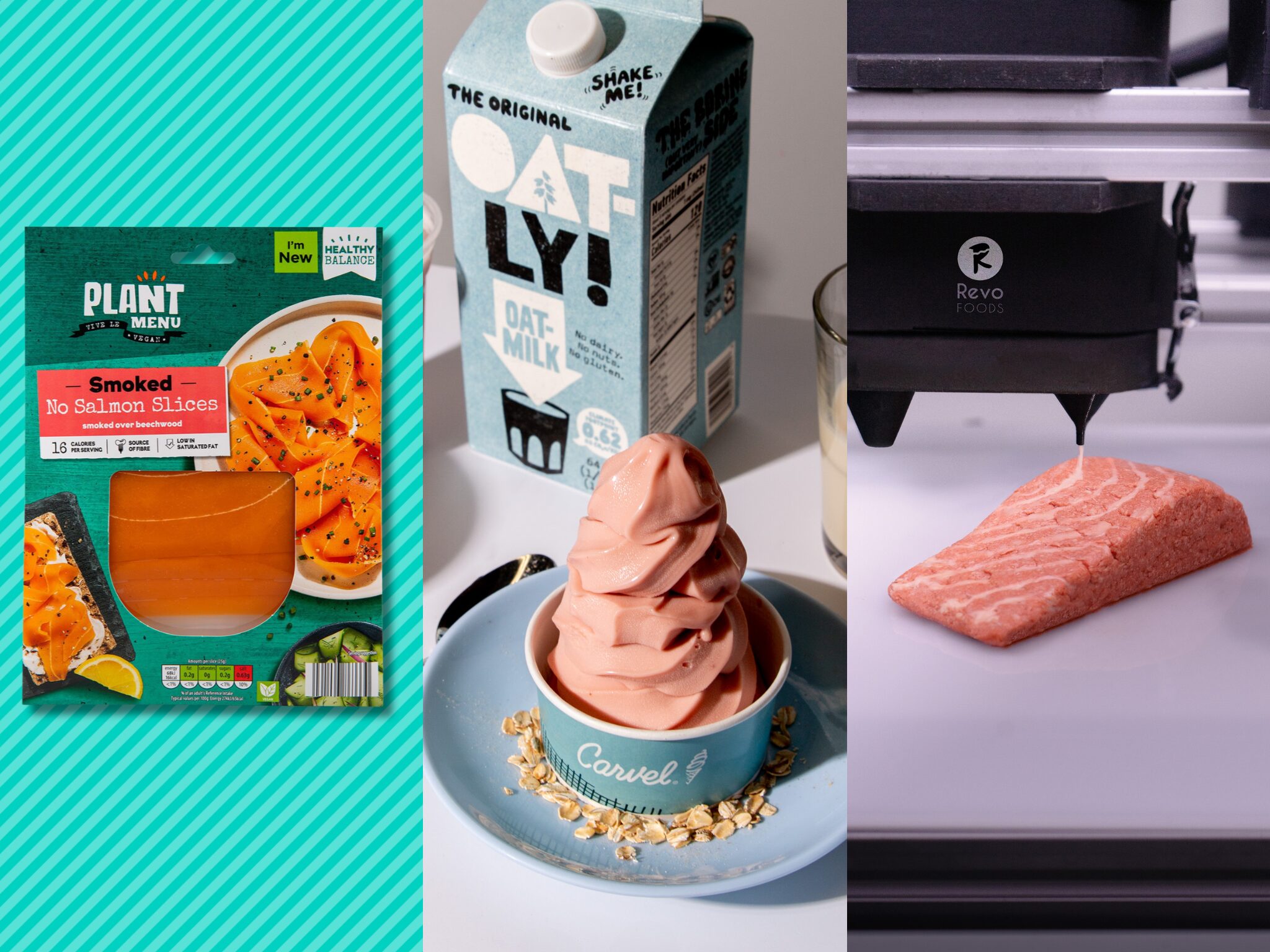
In our weekly column, we round up the latest news and developments in the alternative protein and sustainable food industry. This week, Future Food Quick Bites covers Oatly’s new partnership with Carvel, price fluctuations for meat and eggs, and rare labelling wins for plant-based companies.
New products and launches
French alt-meat maker La Vie is continuing its growth, with its new pea protein ham now available in the UK exclusively through its largest retailer, Tesco. It made the announcement with a delightful billboard.
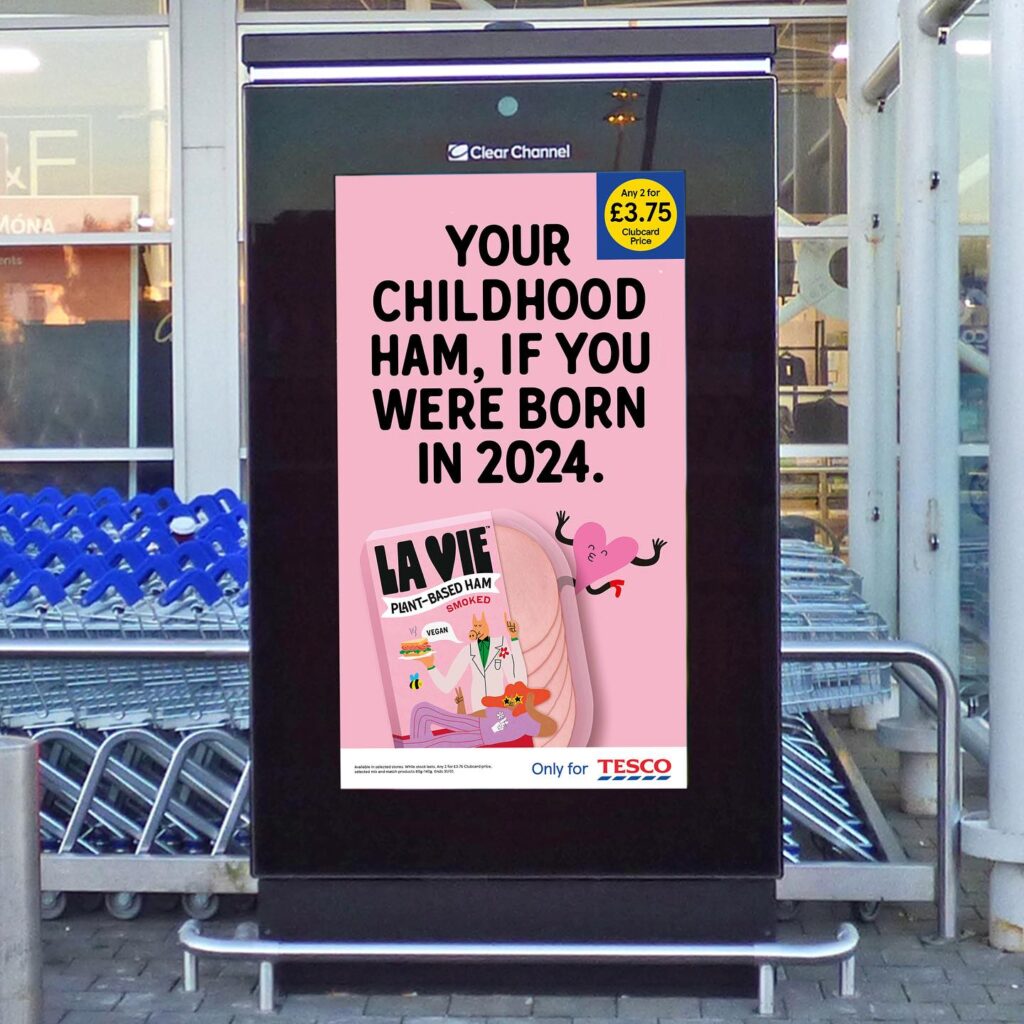
Similarly, Dunkin’ has introduced its vegan doughnuts to the UK market, with plant-based alternatives to three of its bestsellers – Original Glazed, Boston Crème and Strawberry Rainbow – available in most of its 34 locations nationwide.
Continuing in the UK, Aldi has launched its largest-ever vegan cheese range, from Cheddar alternatives and mozzarella to camembert and grated parmesan. The discount retailer has also introduced a vegan smoked salmon as part of its private-label Plant Menu range.
Another company working on vegan seafood is Japan’s Nippon Ham, which is developing a plant-based tuna sashimi for foodservice, slated for an April launch.
Speaking of which, Israeli whole-cut meat producer Redefine Meat is now available at more than 650 foodservice locations in 13 countries across Europe, including at Leonardo Hotels, All Star Lanes, and Compass Group.
Likewise, Irish fast-food chain Boojum has introduced a Carne Asada dish for Veganuary, made using British alt-meat brand [MOCK]‘s mushroom and soy protein beef, and paired with a guajillo chilli sauce.
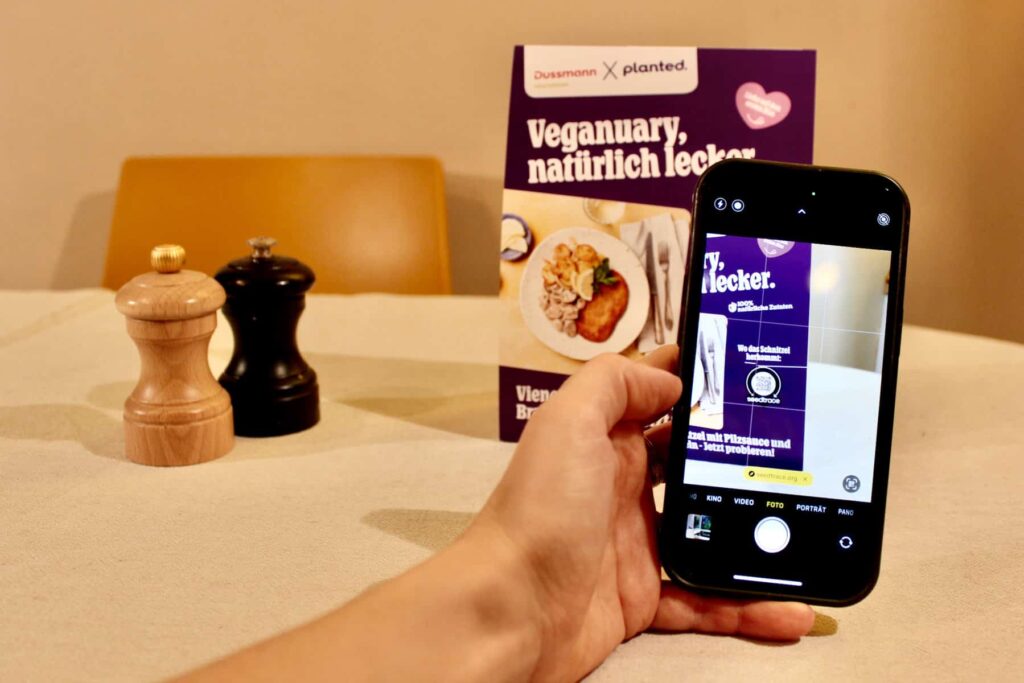
For Veganuary’s campaign in Germany, meanwhile, catering service company Dussmann has partnered with Swiss alt-meat maker Planted and traceability platform Seedtrace, offering supply chain transparency of Planet’s schnitzel via a QR code. It will be available in 60 Dussmann restaurants.
Also in Germany, Rügenwalder Mühle has discontinued its classic animal-derived Schinken Spicker ham as part of its commitment to increasing plant-based offerings. It says the move will free up production capacity for its meatless products.
Elsewhere, US ice cream company Salt & Straw has released a Dairy-Free Decadence range as part of its Pints of the Month series, featuring flavours like Toasted Oat Milk & Cookies, Red Velvet Cake with Cream Cheese Frosting and Bananas Foster with Candied Pecans. Made with oat and/or coconut milk, they can be bought in-store or online.
Another ice cream development: Oatly has teamed up with cult-favourite creamery Carvel, placing five flavours of its oat milk ice creams in more than 300 Carvel stores across 18 US states.

For more American sweet treats, look no further than Harken Sweets‘ better-for-you, plant-based takes on the Snickers and Milky Way bars. Called the Nutty One and The Gooey One, respectively, they contain 75% less sugar and less than 150g of calories, and are available at Fairway Market, Pop Up Grocer, Gourmet Garage NY, and ShopRite, and on its e-commerce site.
In California, Langer Farms has released Apple Honey – only featuring apple juice concentrate and natural flavouring – alongside an Apple Butter SKU (an elevated applesauce), which are available online via its website and Amazon.
Meanwhile, US plant-based manufacturer Franklin Farms has collaborated with Disney to feature Mickey Mouse on co-branded packaging for six of its products. They feature the Disney Check, a symbol indicating compliance with Disney’s Nutrition Guidelines.
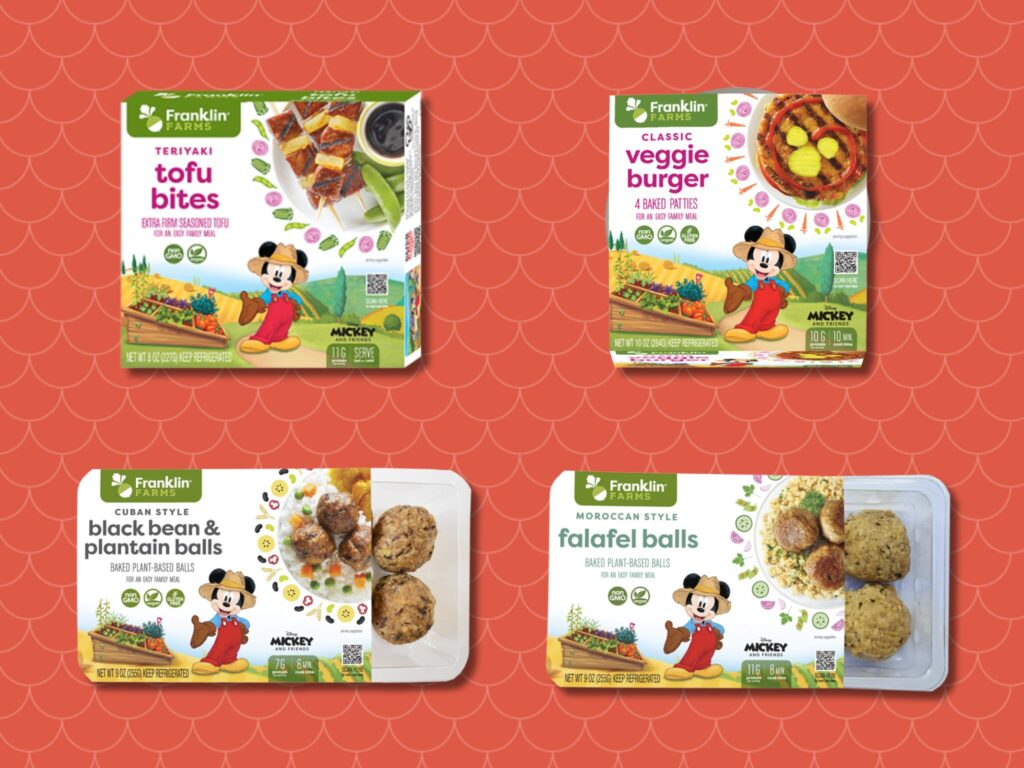
And Canadian vegan frozen meal producer Plant Up has added Butter Chik’n Bites and Shawarma Bites to its appetiser range. Its products are now available at over 650 stores, including Metro, Longos, and Whole Foods.
Finance, manufacturing and corporate moves
Californian alt-meat giant Impossible Foods has hired three women in senior leadership positions, with Elaine Paik and Emma Hutchens joining the C-suite as CFO and chief people officer, respectively, and Alexis Regan taking up the role of senior VP for sales.
Dutch company Vion Food, which makes both meat and plant-based analogues, is closing a pig plant and divesting/selling off its ham brand, pig and beef slaughterhouses, and a pre-packing facility – all in Germany – as part of its sustainability strategy for 2024, following increased competition and African swine fever outbreak.
Dublin-based Sea & Believe has launched its inaugural seaweed farm in Connemara, Ireland to develop ingredients for the food and skincare industries using a red Atlantic seaweed that is richer in protein than fish.
In Austria, mycelium meat producer Revo Foods has unveiled an industrial-scale production method for 3D-printed foods, called the Food Fabricator X2. The 3D-printed whole-cut salmon maker is also crowdfunding to scale up and launch new products this autumn, and has already raised nearly €575,000.
UK biotech firm Multus has raised £7.9M in a funding round and announced what it claims is the world’s first commercial-scale, cost-effective plant for serum-free growth media to produce cultivated meat and milk.
Israeli startup Mediterranean Food Lab has nabbed $17M in a Series A round to scale up its solid-state fermentation tech, which can create flavour ingredients said to transform the sensory attributes of vegan food.
Policy developments
Marking a rare labelling win for the vegan industry, France’s Supreme Court has ruled in favour of the Nutrition & Santé Group, which was accused by the meat lobby of misleading consumers through meat-related terms on its plant-based analogues. (The French government, though, has previously proposed an unprecedented ban on these.)
Yet another labelling achievement came from Chile’s NotCo, which appealed the ban on its NotMilk trademark in its home country. The brand is officially “NotGuilty”, with the Court of Appeals of Valdivia revoking the sentence and rejecting the anti-competition lawsuit filed by dairy farmers union Aproval.
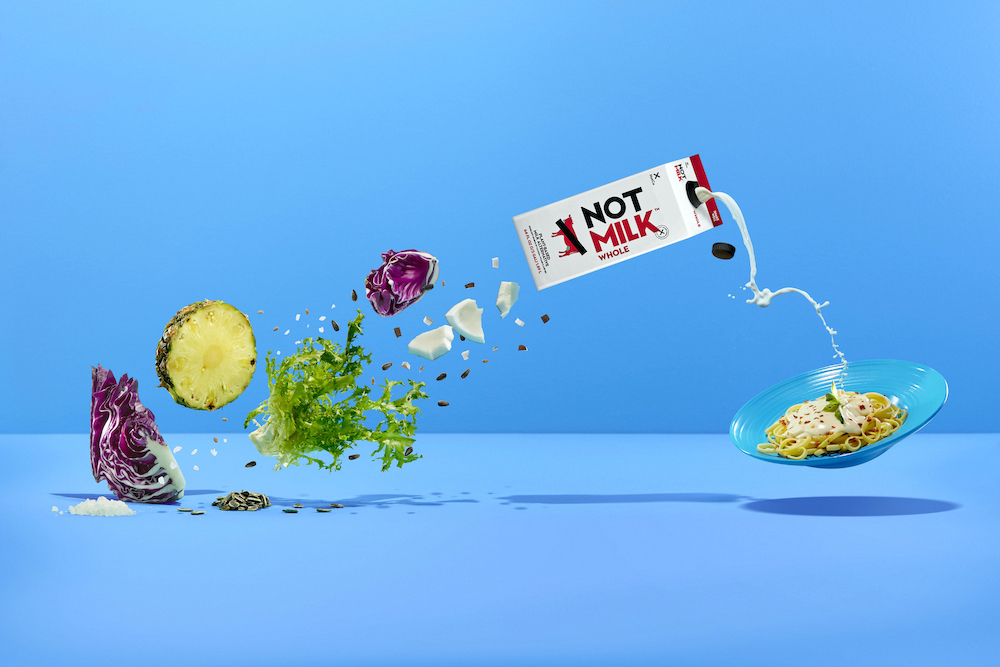
In more animal industry backlash news, Bishop Burton College in east Yorkshire, UK has apologised for a Happy Veganuary post on Facebook and announcing it wouldn’t serve meat two days a week during January. Pushback from pro-livestock students and farmers has led to the idea being abandoned.
Elsewhere, two months on from cutting prices of its own-label Vegavita range across all stores in Austria, Rewe Group‘s Billa has seen sales increase by 33%. Future meat and dairy analogues will now be set at a price on par with or, if possible, lower than their conventional counterparts.
Speaking of prices, beef is expected to cost Americans more this year on the back of a large two-year decline in production. Cattle feeders face much higher prices for their cows as a result of the reduction in cattle supply due to beef herd liquidation.
Similarly, egg and ham prices have soared in the US, with hikes higher than any other food in December, according to the Bureau of Labor Statistics’ latest Consumer Price Index report. While eggs were 23.8% lower than the ‘eggflation’ 12 months before, they were up 8.9% from November. Meanwhile, raw beefsteak prices rose by 11.9% year-on-year, the second-highest increase in that metric.
Research and accomplishments
A study commissioned by LI Food, a Lower Saxony state initiative for food, has revealed that Germans often underestimate the climate and animal welfare implications of dairy, specifically cheese. But despite some scepticism around food tech, respondents were open to trying precision-fermented cheese.
Similarly, a survey by precision fermentation cheese company New Culture revealed that four in five of respondents are willing to purchase animal-free cheese, of whom 80% were meat-eaters. Early adopters are happy to pay $4 more per pizza with the company’s cheese, but taste remains key, with 59% of respondents saying they’d avoid analogue foods if they didn’t taste as good.
Wait for the sizzle! Berlin startup Zayt Bioscience, which upcycles fruit waste into precision-fermented fats, has released a new video showing just how loud the sizzle on its animal-free butter is.
Meanwhile, vegan dog food brand Hownd has been named one of the world’s most ethical businesses by The Good Shopping Guide, receiving a rating of 98 out of 100 in factors like environmental impact, animal welfare and public record.
Finally, the US Plant-Based Foods Association is overhauling its platform to prepare for a “pivotal” 2024, launching a redesigned website, a new digest and monthly newsletter, as well as a revamped members’ portal.
Check out last week’s Future Food Quick Bites.
The post Future Food Quick Bites: Vegan Mickey Mouse, Price Changes & Labelling Wins appeared first on Green Queen.
This post was originally published on Green Queen.